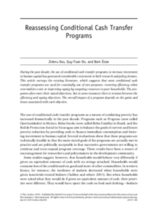During the past decade, the use of conditional cash transfer programs to increase investment in human capital has generated considerable excitement in both research and policy forums. This article surveys the existing literature, which suggests that most conditional cash transfer programs are used for essentially one of two purposes: restoring efficiency when externalities exist or improving equity by targeting resources to poor households. The programs often meet their stated objectives, but in some instances there is tension between the efficiency and equity objectives. The overall impact of a program depends on the gains and losses associated with each objective.
©The World Bank

